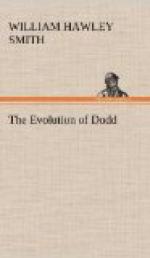This was the teacher to whom “Dodd” came on an October morning, just preceding his ninth birthday. Amos had heard much of Elder Weaver and had boasted not a little of how he would “out argy” him the first “lick” he got at him, and he gazed on these small scions of so notable a stock with a feeling that the contest had already begun. He put the children into their seats somewhat gruffly when they appeared, as if resolved to paralyze his antagonist from the first.
“Dodd” had learned to read by this time, in spite of the hindrance imposed by Miss Stone in the chart class. Indeed, the only redeeming feature in his career as a pupil up to date, was his natural love for reading. The child had a fondness for this art, a genius for it, if you will, which triumphed over all obstacles, and asserted itself in spite of all attempts to cripple it, or to bring it down to the level of his more limited attainments, or to raise these lesser powers to a line with his special gift.
And in this respect, too, “Dodd” was like other children, or other children are like “Dodd.” Most of these individualities have special things that they can do ever so much better than they can do some other things. Why not put them at the things that they can do best, and help them on in this direction, instead of striving to press them down from the line of their special genius, and up from the line of their mediocrity, so as to have them on one common level, as some would fain have all the world?
As said, “Dodd” had a special genius for reading. When he began to go to school to Amos this fact appeared at once, and it speedily became a casus belli between the two, for Amos was a blockhead with a reading book, and the boy put him terribly to shame before all the school.
He could talk, but he could not read.
“Dodd” had come to school with a sixth reader. It was a world too wide for his small attainments, with its quotations from Greek and Latin orators, Webster, Clay, Hastings, et al., but it was the only reader of the series used in Amos’s school that grandma Stebbins could find in the carefully saved pile of old school books that were housed in the garret, the residuum of former school generations. So, with a sixth reader, the boy went to school.
This is the common way of supplying children with school books in the rural districts. He brought, also, an arithmetic and a speller, but as his knowledge of the first branch only reached to that part of it which lies on the hither side of the multiplication table, and as “Webster” is the chief speller used by children in country schools, and he could not go estray in that point, these facts need not be emphasized.
As he brought a sixth reader, to the sixth reader class he went. This also is common in schools of this class. It is not supposed to be by those who talk learnedly before the legislature about “grading the country schools,” and all that, but it is the way things are done in the country, as any one will find who will take the pains to go into the country and find out. It is understood by the patrons that it is the teacher’s business to put the pupil to work with the books that he brings with him, and in putting “Dodd” into the sixth reader Amos only did as the rest do in this regard, that is all.




